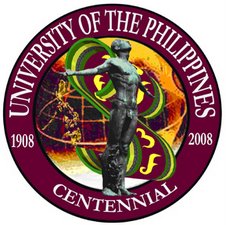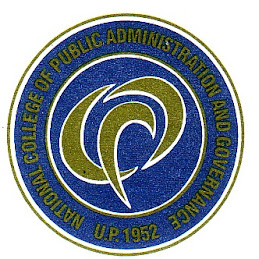


The Workshop will be held on 22-25 October 2008 back-to-back with two other conferences under the umbrella theme: "Governance in a Triptych: Environment, Migration, and Peace and Order." The objectives are the same except for the date. The co-sponsor is the Eastern Regional Organization for Public Administration (EROPA). This blogspot will update you with the details, but you may also wish to visit EROPA's website at
http://www.eropa.org.ph/Good news! This blogger and his international partners were awarded a grant by the
Asia-Europe Foundation to hold an Asia-Europe Workshop entitled, "Towards the Development of Teaching Program for Higher Education in Environmental Governance." It is to be held in the Philippines and will be organized by the
U.P. National College of Public Administration and Governance (U.P.-NCPAG) on 22-25 October 2008.
Environmental governance experts from Europe and Asia will meet in Manila for this workshop. Interested parties are welcome to join. Please e-mail this blogger at
efloranoy@yahoo.com for more information.
We are also in need of sponsors.Confirmed participants and papers are as follows (as of this writing):
· Day 1 (28 May 2008): Session 1: The Imperatives for “Environmental Governance” in Europe and Asia
1. “The Environmental Sustainability of the Southeast Asian Region” – Dr. Ebinezer R. Florano (University of the Philippines, Philippines)
2. "The EU: a Model for Regional Environmental Law and Cooperation?" - Dr. Jonas Ebbesson (Stockholm University, Sweden)
· Day 1 (28 May 2008): Session 2: The Role of the Academe in Environmental Governance: European and Asian Experiences.
1. “Environmental Governance” – Dr. Ebinezer R. Florano (University of the Philippines, Philippines)
2. “Environmental Governance: Critical for Sustainability” – former Philippine Environment and Natural Resources Secretary Elisea Gozun (Philippines)
3. "Relative Roles of Academe, NGOs and Private Consultancies in Environmental Governance - a case study of Air Quality Management in the UK and Europe" – Dr. Tim Chatterton (University of the West of England, UK)
4. "Transdisciplinary Academic Institutions Concerning Environmental Norms and Actions" – Dr. Jonas Ebbesson (Stockholm University, Sweden)
· Day 2 (29 May 2008): Session 3: Governance of the Commons: Earth, Water, and Air.
1. “Integrated Approach to Adaptation to Climate Change: Case Studies from Europe and Asia” – Dr. Faizal Parish (Global Environment Centre, Malaysia)
2. "The Preservation of Biodiversity at a Global Scale: Links Between Development Aid, Revenue and Conservation Efforts" – Dr. Sophie Thoyer (Ecole Nationale Supérieure d'Agronomie de Montpellier , Montpellier, France)
3. “Public Participation in Water Governance” – Dr. Jona Razzaque (University of the West of England, UK)
4. “Developments in the Earth System and the Need and Prospects for Multilevel Global Governance” – Dr. Gerd Winter (University of Bremen, Germany)
· Day 2 (29 May 2008): Session 4: Environmental Governance: Local, National, and International/Global Levels
1. “Public Participation in Environmental Governance in China: Some Comments on Recent Development of the Environmental Impact Assessment Law" – Dr. Qin Tianbao (Wuhan University, China)
2. “Environmental Governance in ASEAN (Association of Southeast Asian Nations): A Study at a Regional Level” – Dr. Koh Kheng-Lian (National University of Singapore, Singapore)
3. “Implementation of the ASEAN Peatland Management Initiative and Strategy 2006-2020” - Dr. Faizal Parish (Global Environment Centre, Malaysia)
4. "The Importance of National-Local Frameworks in Environmental Governance" – Dr. Tim Chatterton (University of the West of England, UK)
5. “Development of Participatory Environmental Governance in Europe and Asia” - Dr. Jona Razzaque (University of the West of England, UK)
6. "Economic Incentives for Environmental Governance in China" – Dr. Li Guangbing (Wuhan University, China)
7. “Environmental Conditions and Environmental Governance in Europe:
Challenges and Responses in Historical Perspective” – Dr. Gerd Winter (University of Bremen, Germany)
The concept paper for this workshop is below:
I. Introduction to the Topic and Scientific Objectives
European and Asian countries share one thing in common, though at different point in time - problems associated with environmental degradation. However, the former has already learned its lessons after reaping the whirlwind of environment-related problems, e.g., acid rain, Mediterranean Sea pollution, etc., for the pursuit of progress and industrialization. On the other hand, many developing countries in Asia (and even developed ones) are said to be following the same potentially environmentally-destructive pathways their European counterparts took in the past, all in the name of economic development. This situation in Asia is aggravated by the reality that some neighboring countries do not see eye-to-eye for regional environmental cooperation due to political and/or historical misunderstandings.[1] Environmental problem-solving in the Asian region is made complex by differences in economic, political and cultural conditions. A challenge for the region is to develop governance mechanisms that can address both regional and global environmental problems. Although there are a number of regional organizations (e.g., Association of Southeast Asian Nations, and South Asia Association for Regional Cooperation) and initiatives by the United Nations Development Programme, United Nations Environment Programme, and the Institute for Global Environmental Strategies, there is no initiative to develop a university curriculum on environmental governance.
Europe has so much to offer to Asia in terms of sharing the knowledge, expertise, and skills in Environment Governance which it has developed over the last 30 years. These are evident in the large number of legislative measures of the European Union and its member-states which are said to be broad in scope, extensive in detail, and often stringent in effect. Hence, Europe, as one community represented by the EU, has acquired credibility as an international environmental actor in its own right. EU is also acknowledged for its various contributions to global environmental governance, especially on the issue of climate change. However, there is an increasing observation that “Europe has shifted its ecological burden onto other countries while safeguarding more of its own ecological resources.”[4] If Europe continues with this, it may erase all the gains and respect its environmental leadership has reaped from the world.
Both continents experiences on preventing, monitoring, and mitigating the effects of environmental degradation could serve as an opportunity for inter-regional environmental cooperation. It is said that Europe has the opportunity to forge “eco-innovation” in partnership with Asian countries.[5] For example, to help both continents achieve Target 9 of Goal 7 of the Millennium Development Goals which call for the integration of the principles of sustainable development into country policies and program and reverse the loss of environmental resources (where most European and Asian countries failed), it was pointed out by a report in the Asia-Europe Environment Forum Conference in 2005 that inter-regional cooperation, coordination, and partnership between Europe and Asia should be initiated. The cooperation should center on organization and management system, institutional capacity, and tools and methodologies in implementing the MDG in both continents.[6]
Academicians from various disciplines, especially those whose expertise is “Environmental Governance,” from the two continents have the potential to forge Asia-Europe inter-regional environmental cooperation. Given their expertise, knowledge, and skills, they could assist government policy- and decision-makers formulate and implement environmentally-sustainable development strategies. However, given the wide geographical, cultural, socio-economic, and political differences among the countries of the two continents, Environmental Governance scholars have to meet not only to get the state of the environment of Europe and Asia in situ, but draw up Environmental Governance curricula and establish inter-regional network. A growing critical mass of scholars, practitioners, and policy analysts that will be produced by the university programs on Environmental Governance would provide sustainable supply of environmental policy experts in, and for the benefit of, both continents.
To achieve the objectives mentioned above, the holding of an international experts’ workshop on Environmental Governance curriculum development is proposed. The overall aim of the project is to enhance the relationship of Higher Education Institutions (HEI) in Asia and Europe to strengthen graduate curricular programs on Environmental Governance based on the sharing of best practices among participating countries. With this aim, the project will promote and develop curricula on Environmental Governance - both as a discipline in itself and as a part of other disciplines in Asian and European academic institutions. The underlying theme of these courses will focus on environmental sustainability and poverty reduction within the context of intense economic development. These courses will enable students to learn about the environmental, ecological and economic aspects of governance in Europe and Asia - leading to a stronger relationship between these two continents. The curriculum will develop an academic network and facilitate increased access to knowledge and high quality teaching materials. The network and the publication will directly benefit the university teachers and students of the participating countries, and ultimately the people working on Environmental Governance within these countries. The exchange of experience and knowledge gained in this project will enable participants to develop similar courses in their own academic institutions. In the end, the workshop will raise awareness of environmental issues and contribute to the development of strong Environmental Governance in Europe and Asia. Almost all/All of the socio-economic development plans of the participating countries highlight the importance of an improved governance framework as a mean for achieving sustainable development in these countries.
The specific aim of the multi-disciplinary network of participating countries is to bring together several multidisciplinary themes, examine the practices of Environmental Governance in Europe and Asia, and provide a holistic view of Environmental Governance. The foremost concrete objective is to support the participating countries in developing a curriculum on Environmental Governance; and build a multi-disciplinary network of academics. The expected results of the project include: forge a consensus to create a curriculum on Environmental Governance; and create a regional network of academics between Europe and Asia. With this aim, the experts’ workshop will:
(i) Identify topics or areas which could be incorporated as parts of a curricular program with both European and Asian influence and up-to-date knowledge on environmental governance; and
(ii) Create a network of faculty specialists with multi-disciplinary backgrounds from partner universities in Asia, supported by European partners, in order to build a broad knowledge base at the academic level.
[1] Dr. Bernhard Köppen (2005), “Workshop Report: Cross-Border Environmental Protection in Central Europe and Northeast Asia,” Asia Europe Environment Forum Conference 2005 <> 12 January 2006.
[4] Gorm Dige (2005), “How Europe and the world interact – the demand for environmental resources,” Asia Europe Environment Forum Conference 2005 <> 12 January 2006.
Asia-Europe Environment Forum Conference Secretariat (2005), “Workshop Concept - 1/3 of our Planet: What can Asia and Europe do for Sustainable Development?” Asia Europe Environment Forum 2005 <> 12 January 2006.


 The Workshop will be held on 22-25 October 2008 back-to-back with two other conferences under the umbrella theme: "Governance in a Triptych: Environment, Migration, and Peace and Order." The objectives are the same except for the date. The co-sponsor is the Eastern Regional Organization for Public Administration (EROPA). This blogspot will update you with the details, but you may also wish to visit EROPA's website at http://www.eropa.org.ph/
The Workshop will be held on 22-25 October 2008 back-to-back with two other conferences under the umbrella theme: "Governance in a Triptych: Environment, Migration, and Peace and Order." The objectives are the same except for the date. The co-sponsor is the Eastern Regional Organization for Public Administration (EROPA). This blogspot will update you with the details, but you may also wish to visit EROPA's website at http://www.eropa.org.ph/
